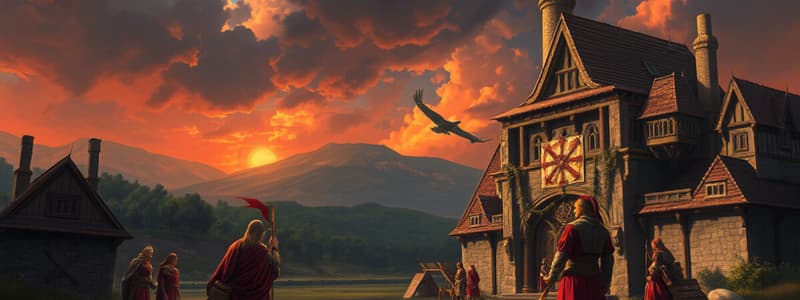Podcast
Questions and Answers
What was the primary purpose of the manor estate?
What was the primary purpose of the manor estate?
- To provide everything needed for the local population (correct)
- To house the king and his court
- To serve as a military base for the lord
- To act as a marketplace for regional trade
What type of agricultural system was primarily used in the early Middle Ages?
What type of agricultural system was primarily used in the early Middle Ages?
- Crop rotation integrated with livestock
- Three-field rotation system
- Two-field rotation system (correct)
- Water management system
What did serfs have to provide to the lord of the manor?
What did serfs have to provide to the lord of the manor?
- Regular cash payments for land use
- Labor to build the lord's castle
- Partnership in all farming equipment
- A share of their crops and livestock products (correct)
What could limit the lord's powers over the serfs?
What could limit the lord's powers over the serfs?
What role did the lord play in the protection of the manor?
What role did the lord play in the protection of the manor?
How did the growth of the population affect land use during the Middle Ages?
How did the growth of the population affect land use during the Middle Ages?
What essential services did the lord provide to the serfs?
What essential services did the lord provide to the serfs?
What was a significant consequence of serfs' inability to leave the estate?
What was a significant consequence of serfs' inability to leave the estate?
What would likely happen to the manor if an enemy attacked?
What would likely happen to the manor if an enemy attacked?
What was a common activity of serfs on the manor estate?
What was a common activity of serfs on the manor estate?
Flashcards are hidden until you start studying
Study Notes
Manorialism
- Lords resided in castles or manor houses, surrounded by farmland.
- Manor estate functioned like a self-sufficient village for food production and living.
- Serfs, bound to the land, worked for the lord and were allowed to use the land for their sustenance.
- Farming activities included growing crops and raising livestock; resources like wood were also used.
- Lords provided essential services: mills for grain grinding, community ovens for baking, and farming equipment such as plows and wagons.
- Protection from enemies was offered by the lord’s army, ensuring safety for manor inhabitants.
- In return, serfs worked predominantly for the lord, contributing a portion of their produce, including milk and eggs.
- Serfs were contractually restricted from leaving the estate or marrying without the lord’s approval, with only the king and Church having authority to limit the lord's powers.
Medieval Innovations
- Growing population created increased demand for food, leading to the clearance of forests and drainage of lakes/marshes for agricultural expansion.
- Agricultural techniques evolved, transitioning from a two-field rotation to a three-field rotation system for improved yield.
- Two-field rotation involved planting half the land while allowing the other half to regain nutrients by remaining fallow.
- The three-field rotation allowed for planting in autumn, spring, and leaving a third land fallow, effectively doubling crop yields.
- Development of heavy plow technology enabled cultivation of dense, moist clay soils common in northern Europe, further enhancing food production.
Studying That Suits You
Use AI to generate personalized quizzes and flashcards to suit your learning preferences.




